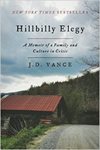
Hillbilly Elegy
by JD Vance
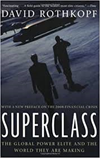 Superclass Superclass
by David Rothkopf |
Regina Rabinovich, MD, MPH, President
I've reading two books right now, and they are extremes, but the contrast is added interest. Hillbilly Elegy, a personal story of Scots-Irish immigrants largely caught in a cycle of white poverty in the U.S. And Superclass of the people who are not only the super rich but the upper nth percentile who meet up at Davos. Thinking about these extremes parallels some of the tensions in the U.S. today. |
|
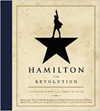 Hamilton, the Revolution Hamilton, the Revolutionby Lin-Manuel Miranda and Jeremy McCarter
|
Patricia F. Walker, MD, DTM&H, FASTMH, Past President
What an inspirational book! It is the behind-the-scenes story of Hamilton, the Broadway musical, and served to remind me of the power of creativity and storytelling of the history of the founding of the United States. As the song says, “how does a bastard, orphan, son of a whore and a Scotsman, dropped in the middle of a forgotten spot in the Caribbean by providence, impoverished, in squalor, grow up to be a hero and a scholar?” It is a powerful story and inspires me to bring my best to my work, and to listen to stories. If you are in need of a book to inspire you during hard times, this is definitely high on the list. I look forward to seeing the play on Broadway this fall. |
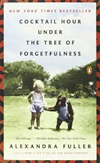
Cocktail Hour Under the Tree of Forgetfulness
by Alexandra Fuller
|
Daniel G. Bausch, MD, MPH&TM, FASTMH, Scientific Program Chair
I keep coming back to Alexandra Fuller and am never disappointed. This book is about her mother’s life and journey from the Scottish Highlands to East Africa. As usual, Fuller tells the story through her subtle mix of charm and humor on the backdrop of the sober and violent history of war in the Zimbabwe and Mozambique in the 1960s and 70s. You laugh on one page, cry on the next. I always learn a lot about history and human nature from her books.
|
|
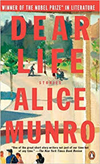
Dear Life
by Alice Munro
|
David A. Fidock, PhD, FASTMH, Councilor
I admit to not finding much time to read books these days, but I’ve been reading Dear Life, a collection of short stories by the wonderful Canadian author and Nobel Laureate Alice Munro. Her stories are refreshingly sincere, beautifully written, with interesting twists and turns and keen insights into human nature. A perfect antidote also to sleepless hours that can result from the pressures of academic life. |

Hillbilly Elegy
by JD Vance
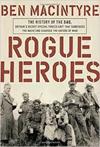
Rogue Heroes
by Bem Macintyre
|
Nicole Achee, PhD, Councilor
Hillbilly Elegy
My career takes me to many places around the world where I interact with various people from an array of cultures. I wanted to learn more about a unique culture in the USA, that of Appalachia.
Rogue Heroes
I have always been intrigued by wartime heroism, bravery and sheer grit. I have a great admiration (and fascination) for those that voluntarily put themselves in harms way in challenging situations. Special forces units are an extreme representation of such individuals. Learning about the persons and their characteristics who shaped the future of clandestine operations has been interesting. |
|
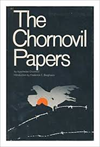
The Chornovil Papers
by Vyacheslav
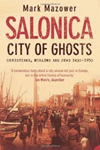
Salonica, City of Ghosts - Christians, Muslims and Jews 1430-1950
by Mark Mazower
|
Nikos Vasilakis, PhD, FASTMH, ACAV Chair
The Chornovil Papers offers a classic example of abuse of power by authoritarian regimes. As Zbigniew Brzezinski indicated in his foreword, "...it is a deeply moving human document, and the element of human tragedy which it expresses transcends even the most important political issues."
Salonica is a thrilling evocation of the complex historical, ethnic and social history of a Greek city serving as host or more precisely a seductress of a city to people escaping their own past and re-inventing themselves in ways that could surprise even themselves. |
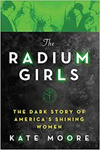
The Radium Girls: The Dark Story of America’s Shining Women
by Kate Moore |
Laura Kramer, PhD, FASTMH, Councilor
This disturbing but uplifting book tells the story of the dial painters in the early 20th century who took on the radium companies for whom they worked, even as they were dying of radium poisoning from painting the luminous numbers on watch dials and airplane instruments used during WWI. The affected women fought the callous company that put profit above workers, disbelieving townspeople, dishonest lawyers and inadequate laws protecting workers. But they bravely persisted and finally won their case in the 1930s. Kate Moore is unflinching in describing how these women suffered; she puts a face on them as human beings whom we get to know and care about while the companies considered them nothing more than expendable. The experience of these women cries out for worker protection with good healthcare, and a legal system that works for the individual rather than the corporation.
|
|
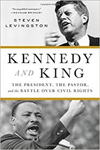
Kennedy and King. The President, The Pastor, and the Battle Over Civil Rights
by Steven Levingston
|
John W. Sanders, MD, MPH, FASTMH, Clinical Group President (ACCTMTH)
It is a powerful recounting of the early civil rights movement and MLK's effective persuasion of a reluctant JFK into taking action. |
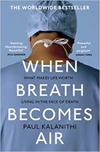
When Breath Becomes Air
by Dr. Paul Kalanithi
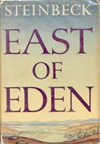
East of Eden
by John Steinbeck
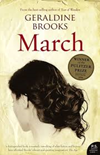
March
by Geraldine Brooks |
David R. Hill, MD, DTM&H, FASTMH, Secretary-Treasurer
When Breath Becomes Air
A deeply moving memoir written that carries us on a journey from his childhood through experiences in medical school, marriage and his neurosurgical training at Stanford. It is during this training and prior to his final year as a resident he is diagnosed with widely metastatic lung cancer.
His honest and often painful confrontation with a terminal diagnosis, his search for answers about death, and his relationship with colleagues, his physicians and most importantly his wife and family are portrayed with deep feeling, insight and beautiful prose. His wife, Dr. Lucy Kalanithi, an internist, completes the story in a powerful epilogue. This should be read by a wide audience, and particularly by all in the medical field.
East of Eden
This allegorical story by John Steinbeck follows two families, the Trasks and the Hamiltons, in California's Salinas valley at the turn of the 20th century. Steinbeck uses his skills as a writer to portray setting, emotion, conflict and love through dialogue. Twin brothers, Cal and Aron (modern versions of Cain and Abel) vie for their father’s love. It comes easily to Aron, but Caleb struggles to be a son of which his father can be proud. Steinbeck explores the human condition with great depth, with much of the wisdom coming from Lee, the Trask’s Chinese servant, Abra (Aron’s girlfriend), and the elderly Sam Hamilton.
Steinbeck called it his greatest work. A 1955 movie adaptation stared James Dean who was nominated for an Oscar for his performance.
March
The setting is the mid-1800s at the beginning of the Civil War. John March, a chaplain living in Concord, Mass, with his wife and four daughters is an idealist who loves the constant intellectual discussions with his neighbors, the Thoreau’s, Emerson’s and Hawthorne’s. At the age of 40, idealism prompts him to join the soldiers going to fight against the Rebels as a chaplain. He is ‘supported’ in this decision by his wife, an avid abolitionist who is a link in the underground railroad.
Mr. March’s idealism comes up abruptly against the reality of a brutal, unfair war, where everyone is a casualty – either physically or emotionally. He struggles with feeling inadequate, and the burden he has placed upon his family forces difficult choices.
The characters are richly drawn through detailed research by the author. The book mirrors Louisa May Alcott’s “Little Women”, in this case focusing on the absent father, who goes to serve the Union cause. March won the Pulitzer Prize for fiction in 2006. |
|
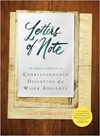
Letters of Note: Volume 1: An Eclectic Collection of Correspondence Deserving of a Wider Audience
by Shaun Ushe
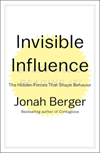
Invisible Influence: The Hidden Forces that Shape Behavior
by Jonah Berger |
Karen A. Goraleski, Executive Director
Letters of Note:Volume 1
This is a fascinating compilation of letters and notes written by important or just interesting figures in history. Not only do you see the transcribed note, you see the image of the original note (where available). Each letter is a delicious glimpse into the life of that individual. No fabricated personas like today’s reality TV and social media. In Queen Elizabeth’s own hand, she writes to Dwight Eisenhower giving him the recipe for the drop scones (aka pancakes) that he enjoyed while he and Mamie visited her at Balmoral Castle. There are notes from Zelda Fitzgerald to F. Scott, from Mick Jagger to Andy Warhol, from Alleta Sullivan to the U.S Navy writing about the deaths of her five sons in World War II and the response from President Franklin D Roosevelt.
Invisible Influence
Just when you think you make your own decisions, follow your own path, do what feels right for you – you read a book like this and find out, hmm, not really. Other people’s behavior has much more of an impact on us than we think. |